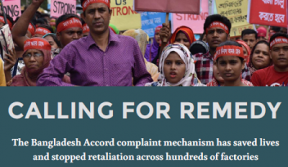My job is seasonal. There’s more work during the asparagus, grape, and artichoke harvests. I signed a contract in the APEISA Company, but I never signed a contract with any other companies I worked for. They would just take us in and tell us what to do. During 2008, I continued to work in the non-traditional agro-export industry in other companies, mostly in the grape harvest. I am paid weekly, according to how much I produce. It’s $48 a week in high season, in low season I earned between $13 and $16 a week. There’s no fixed monthly salary, it’s only determined by how much we produce and how much we advance. We would be out working for 14 to 16 hours a day. They didn’t tell us when our break was. You had to ask for a break, only at the point where you could no longer go on working. The company didn’t give us food and we couldn’t bring food so we all had to buy something inside, including water. Sometimes my co-workers didn’t eat or drink water in order to save money!
I worked 9 months in the fields but not continually. I had to stop certain weeks and start again the next week. When there was a lot to produce, I worked all day, 112 hours a week, 448 hours a month more or less, without taking Sundays off, getting paid nothing for overtime because they pay is according to how much we produce. On a normal day, I wake up at 4am, cook, wash up, and go to work before 6 am to get my ride to work. We left work when there was nothing left to produce. My husband would be busy with his work and never helped with the chores. Now it’s even more difficult because I have a daughter, I have to find someone to take care of her when I’m at work. I usually leave her with my mom, she takes care of her.
Women and men have different jobs. Women can’t drive the tractors, only men and those jobs pay more. Most of the women who have been promoted to supervisors studied at the university. Safety is also a concern. In grape harvesting, they put a liquid hormone on the grapes to help them develop and it stings our eyes and makes them water. When anyone asks permission to get medical insurance, they always refuse to give it to us. I’ve never been in a union although there are two unions in Ica for agro export industries but they fired many workers for trying to unionize.
The economic crisis has affected us. We had work until December 2008 but now there’s nothing. They tell us that there’s no more production because of the economic crisis and the price of asparagus has gone down. They tell us to return in March to ask if there’s work. I now live with my father and share my expenses with my husband. When there’s work I try to save money but then work ends so I never have enough money. I never have enough to fix the house. We need at least $320 a month to live better. (Basic living costs for a family of two are estimated to be $380 a month, calculated by the Peruvian National Institute for Statistics and information). I barely earned $200 a month in high season, when work was plentiful. I have a continuing case against APEISA. I’m in my last step of the trial and my lawyer told me that it has already been a year since I’ve been demanding my pay. I’d like to win this case and I want to make them pay for my pre-natal and post-natal care. Most women don’t pursue their cases because they’re scared of getting fired. I’d like some organization to support us and help us because we’re alone.
Rosemary is not alone. Unskilled women workers have entered export-processing industries throughout the developing world at an alarming rate. Women overwhelmingly occupy the lowest paying, most unstable jobs, producing our clothes, agricultural products and other luxuries for export to the US.

